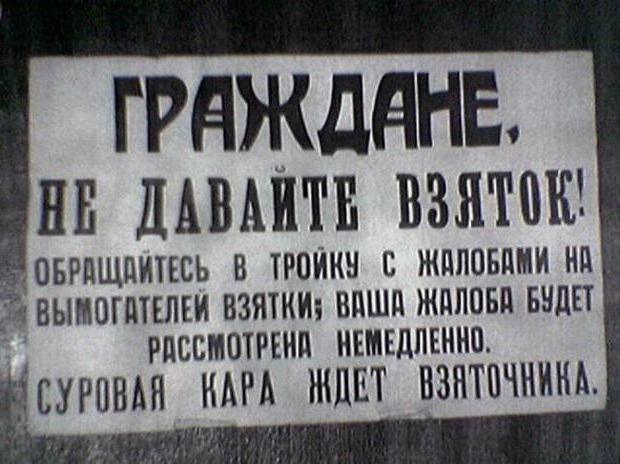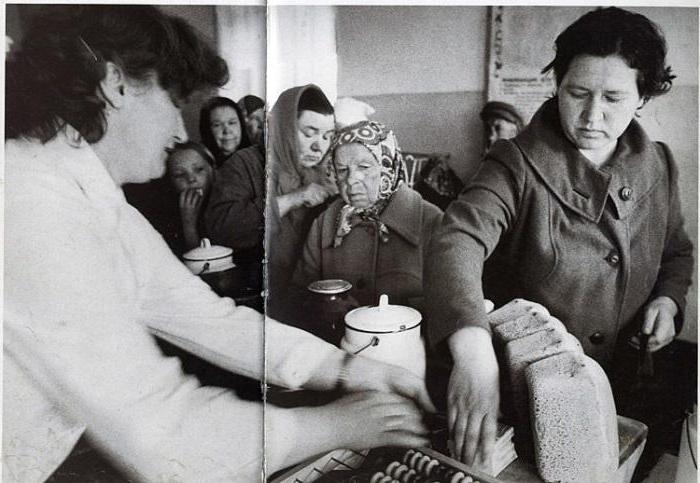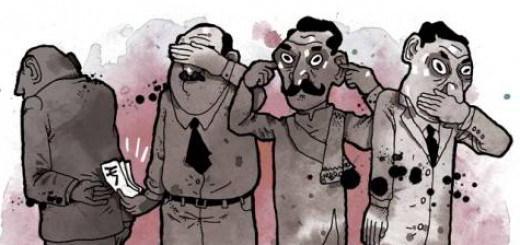The scandalous film of the opposition Navalny again exposed the problem of corruption in our country. Our society has become accustomed to high-profile anti-corruption revelations: senior officials, law enforcement officers, mayors, governors - it seemed that nothing could surprise Russian citizens. Everything changed after a man from the top ten senior officials, Minister of Economic Development A. Ulyukaev, sat on the dock. Perhaps this was the peak of the fight against corruption. But Navalny swung even higher: at the prime minister and president. The history of revelations of the top officials of the state is not uncommon in world practice: recent events in France, South Korea, Argentina make it clear that even heads of state are “dishonest.”

The problem of corruption in Russia has been at all times. History has recorded a conversation between Peter the Great and Alexander Menshikov - a loyal friend and ally of the emperor. The reformer suggested that a second person in the state introduce the death penalty for corruption, but Menshikov bluntly stated that there would be no subjects left in the country. Subsequently, historians have established that the former groom was himself involved in ambitious corruption schemes.

It is believed that corruption in the USSR was absent. Many communists, patriots who call for the introduction of the death penalty for embezzlement, and other people who did not delve into the study of this problem, like to emphasize this. In the article we will try to answer the question: "Was there corruption in the USSR?" And we will begin the story from the Stalin era, since many believe that it was Joseph Vissarionovich who was able to defeat the tendency of citizens to bribery.
The fight against corruption in the USSR under Stalin

Stalin fought both with internal political enemies and with corruption. I want to immediately dispel the myth: the embezzlers were not put up against the wall for “three spikelets stolen from the field,” as many of the liberal and anti-Stalinist wing of historians like to tell today. Of course, excesses were everywhere, and during the Great Patriotic War they judged in all severity of wartime. However, after the war, Stalin completely prohibited the death penalty.
There was corruption in the USSR, but, as many people think, there was no total execution for it. Only in 1950 they again decided to introduce execution, but only for espionage, intelligence and anti-Soviet activities. For economic crimes, they were not sentenced to the highest degree.
How did they fight corruption in the USSR during the Stalin period? Tough measures: the perpetrators received 15, or even 20-25 years, camps for such crimes. Many of them were amnestied after the death of the leader, in 1953.

The peculiarity of corruption in the USSR under Stalin
Corruption in the USSR did not consist of multimillion-dollar bribes, transfers to foreign offshore companies, various “kickbacks”, but the use of high official position. Cronyism and family ties with high-ranking officials are the main problem that destroyed the socialist state. We must pay tribute to Stalin: he did not cover up manifestations of corruption even among his inner circle. Even his favorite is G.K. Zhukov - came to the attention of state agencies in the fight against "robbers of socialist property." The celebrated Marshal was accused of fraud in the delivery of military trophies. His divisions were the first to liberate Europe; he commanded the assault on Berlin. All valuable trophies first fell into his hands.
Zhukov, of course, did not receive the punishment in all severity of Soviet law, but his reputation was seriously shaken after the war.This also affected the service: Zhukov descended the party ladder, although many attribute this to Stalin’s fear of “people's love” for Zhukov.
Leningrad affair
In 1949, the so-called Leningrad affair took place. Liberals and anti-Stalinists consider him political: they say that the "bloody dictator" again took up the old, began the fight against political opponents. However, many declassified documents showed that the cause of the Leningrad affair was corruption in the USSR.
Rodionov M. I., Chairman of the Council of Ministers of the RSFSR, with the assistance of a member of the Central Committee of the All-Union Communist Party of Bolsheviks, A. Kuznetsov, together with high party officials of Leningrad organized an agricultural fair. The problem was that the goods for her came from a national fund to support other regions. In fact, at the fair they sold goods worth 9 billion rubles, which were supposed to go as help to the destroyed country. The amount is simply astronomical for this period. However, this is not all: goods were spoiled in the amount of 4 billion rubles due to the poor organization of the fair. But this is not all: from all corners of the USSR, at the expense of the state, a congress of all leading political workers was organized. And all this happened in conditions of tremendous devastation and famine of the post-war period.

"Leningrad affair" revealed a conspiracy?
The unraveling of the “Leningrad affair” showed that A. A. Kuznetsov everywhere tried to set his people apart. Principle: "You - to me, I - to you." In the Resolution of the Plenum of the Central Committee of the party on this case, a special term even appeared - "grouping."
In the course of identifying all the persons associated with this case, it was found that virtually the entire network of “their” people tried to create a new party - the RCP, and to separate the republic of the RSFSR from the USSR. Of course, we will omit such details, since this is not relevant to our topic, but let’s say: the famous case was launched as a fight against fraud among the highest party leaders. Many of the defendants in this case received 25 years in prison camps for “anti-Soviet activities.”
"The Weavers' Case"
The Weaver’s Case is also anti-corruption. After the war, the country experienced a huge shortage of goods. Particularly “smart” guessed: you can make good money on this. It all started with the head of the interregional office for the distribution of materials for workwear N. Tavshunsky. He unexpectedly noticed that after the war women were significantly "thinner", but the norms weren’t. Tavshunsky gave bribes to many heads of various offices, and they turned a blind eye to the fact that the overalls are too small. From stolen material, civilian clothes were sewn, which were immediately sold out. The estimated damage is 215 thousand rubles. Almost all crooks and bribe takers received a long term and cursed Stalin’s “bloody regime” until the end of their days, although not a single person was shot in this case.

"Bread business"
“Bread business” is the largest corruption scam of the Stalin regime. It got its name due to the fact that the entire criminal group worked in Rosglavkhleb. It was led by the head of the supply department M. Isaev. Corruption was manifested in the fact that, using bribes, bribery, gifts, the gang actually bought scarce goods from various factories.
For example, Isaev got sugar from a confectionery factory, wine, alcohol, and other materials from a winery. With large volumes, it was impossible to track compliance with GOST. In fact, there was less sugar in confectionery, alcohol, etc. in vodka. It was unrealistic to buy this in stores. Isaev’s gang actually created a “black market”. And all this in the most hungry time for the country. Damage to the state was inflicted in almost 1.5 million rubles. The bandits stole 450 kg of butter, more than 2.5 tons of butter, almost 9 tons of flour, etc. Of course, corruption cannot be compared with today's scale, but do not forget that people at this time fed on rotten potatoes and roots, sawdust was added to bread.

Post-Stalin Corruption
After Stalin, the level of corruption in the USSR was not just high, but extremely high. The country was divided into spheres of influence in the distribution of scarce goods. From the late 1960s to the late 1980s a complex corruption system of clan checks and balances has developed. National party leaders have completely merged into deficit distribution schemes. It was then that the principle was finally formed: "everyone has money, but nothing can be bought for them." In fact, he existed until the "shock therapy" of the democratic government of E. Gaidar, when he was replaced by another: "you can buy everything, but there is no money."

Deficit and corruption are elements of the Soviet system
Until the mid-1960s there was virtually no anti-corruption system in the USSR. On the contrary, the central authorities used this tool to maintain loyalty and humility. At any moment, it was possible to start an anti-corruption case against the exploding satrap of a republic. In turn, the head of the region could also use this tool against subordinates. Deficit turned into an instrument of earnings, and nepotism and bribery into an instrument of loyalty. Under such a system, there was no punishment for corruption in the USSR.
Of course, there were high-profile anti-corruption processes: the case of Nikolai Shchelokov (Minister of the Interior from 1968-1982), the case of Ocean against the Deputy Minister of Fisheries of the USSR, the Cotton Case against the head of the OBKhSS Department of Internal Affairs of Bukhara Oblast Executive Committee Muzaffarov and others. However, similar processes resemble, rather, the removal of objectionable people, rather than real processes to combat corruption. We observed something similar recently: the case against the Minister of Economic Development Ulyukaev.

Azerbaijani precedent
Anti-corruption in the USSR, or rather his attempt, was undertaken by L. I. Brezhnev. He noticed a dangerous trend: national party elites grew together in gray corruption schemes with local trade and industry so much that it began to threaten the collapse of the Union. Any new representative of power in the republics was either blocked by the local elite or merged with it.
To fight the clan system in Azerbaijan, a new head of the KGB of the republic, Heydar Aliyev, was sent. Nobody knew a new person by sight. This gave Aliyev the opportunity to see with his own eyes the real state of affairs. During the raid, about 40 people were arrested. After that, many scarce goods appeared at stores at normal prices, and food supplies were empty. However, the success was short-lived: two months later, the head of the KGB was known in person by the whole republic, and new attacks were hopeless. Aliyev also exposed the grandest problem of the USSR: any position could be bought for money. Everything was sold: the posts of 1-secretary of the party’s district committee, prosecutor, head of the police department, republican ministers, university rectors, etc.
Summary
Corruption is the real evil of our society, which must be fought with. However, the history of our state shows that this problem has existed at all times. Even harsh Stalinist measures did not stop people from taking bribes and using their official position. We hope that sooner or later we can deal with this problem.